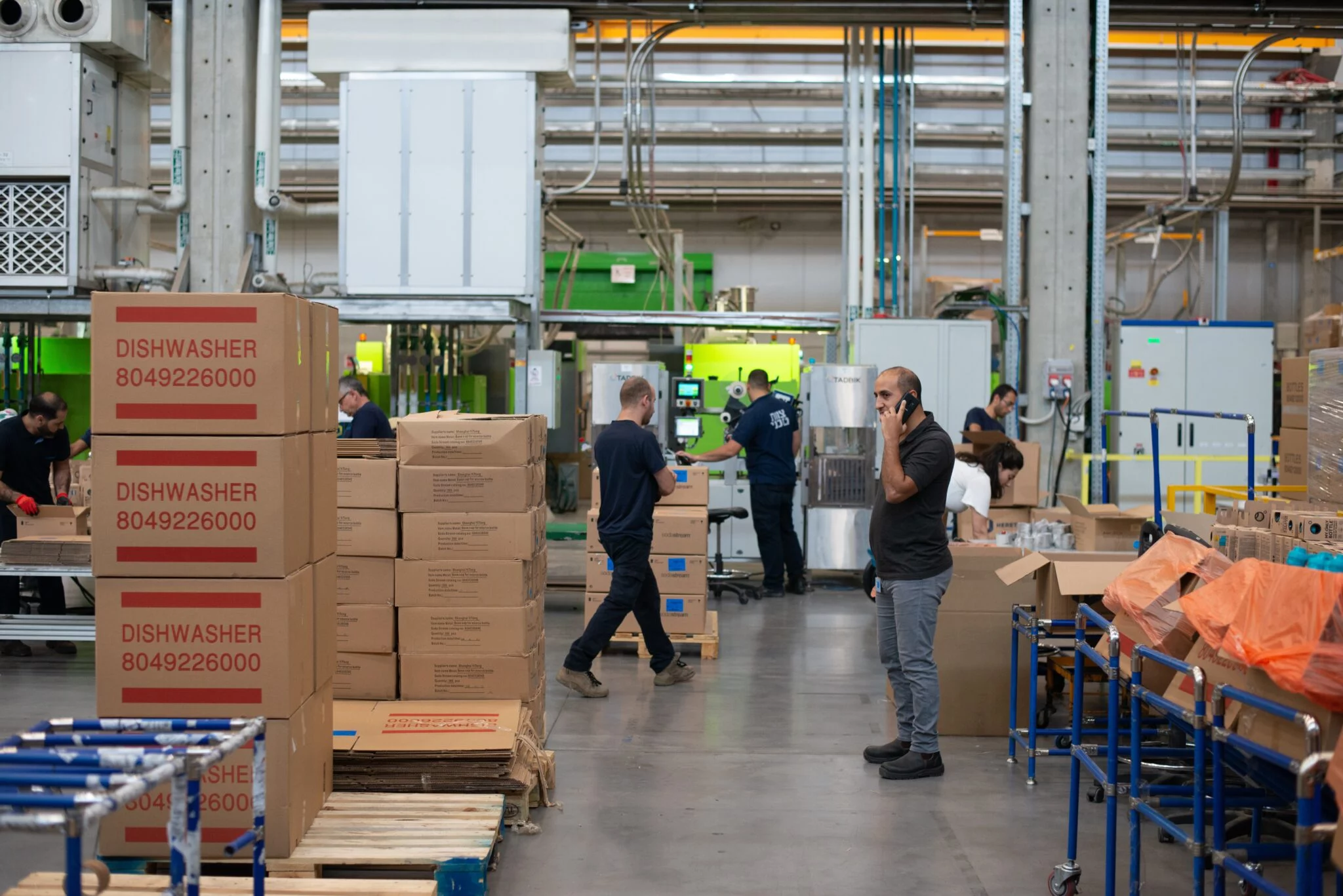A logistics manager is a professional who oversees the movement, storage, and distribution of goods from the point of origin to the final destination. They are responsible for managing the entire supply chain process, including planning, implementing, and controlling the movement of products and materials. Hiring a logistics manager is critical in ensuring the smooth functioning of your supply chain process, resulting in improved operational efficiency, customer satisfaction, risk mitigation, and profitability.
Onboarding a smart logistics manager for your organization can be a daunting task if you are still stuck in the obsolete traditional hiring process. That’s why our interview resource is here to elevate your talent acquisition. Ask the right questions, spotlight their skills and competencies, and ensure the candidate you hire is the right fit.
General Roles and Responsibilities of a Logistics Manager
The role of a logistics manager typically involves overseeing the movement, storage, and delivery of goods and materials for a company or organization. Here are some examples:
- Planning and coordinating: Logistics managers are responsible for planning and coordinating the movement of goods and materials from suppliers to customers. This involves working with various stakeholders, such as suppliers, transporters, and distributors, to ensure that deliveries are made on time and in the most efficient manner.
- Managing inventory: They are also responsible for managing inventory levels to ensure that there is enough stock to meet customer demand while avoiding overstocking. This involves monitoring inventory levels, analyzing sales data, and forecasting future demand to make informed decisions about purchasing and stock levels.
- Managing transportation: Logistics managers must manage transportation and logistics operations, including arranging for transportation, coordinating with carriers and logistics providers, and monitoring delivery schedules to ensure that products are delivered on time and in good condition.
- Ensuring compliance: They must also ensure that their company’s transportation and logistics operations comply with all applicable laws and regulations. This includes ensuring that shipments are properly labeled, that hazardous materials are handled safely, and that all necessary permits and licenses are obtained.
- Analyzing performance: Finally, logistics managers are responsible for analyzing the performance of their company’s logistics operations and identifying areas for improvement. This involves tracking key performance indicators, such as delivery times and inventory turnover, and using this data to develop strategies for improving efficiency and reducing costs.
Skills and Responsibilities a Logistics Manager should have:
Logistics managers play a critical role in ensuring that goods and materials are moved efficiently and effectively throughout the supply chain. Here are some of the key skills and responsibilities that a logistics manager should have:
- Strong organizational skills: Logistics managers must be highly organized, with the ability to manage multiple tasks and prioritize competing demands. This includes managing inventory levels, coordinating transportation, and overseeing the delivery of goods to customers.
- Analytical and problem-solving skills: Analyzing data and using this information to identify inefficiencies in the supply chain and develop solutions to improve logistics operations.
- Communication and collaboration skills: Logistics managers must be effective communicators, with the ability to work collaboratively with internal and external stakeholders, such as suppliers, carriers, and customers.
- Technical skills: Familiarity with logistics software and other technology tools is a must as they are used to manage transportation, inventory, and other logistics functions.
- Knowledge of supply chain management: Logistics managers should have a solid understanding of supply chain management principles and practices, including inventory management, transportation management, and distribution management.
- Leadership skills: They must be effective leaders, with the ability to motivate and manage a team of logistics professionals, as well as provide guidance and direction to other stakeholders involved in the supply chain.
- Attention to detail: Logistics managers must have strong attention to detail to ensure that all logistics operations are executed accurately and in compliance with regulations and company policies.
Logistics Manager Operational and Situational Questions
Operational and situational questions can help assess a logistics manager’s ability to perform the day-to-day tasks of the job and handle unexpected situations. Here are some examples:
- What methods do you use to track inventory levels and ensure that there is enough stock to meet customer demand?
- Can you describe a time when you had to negotiate with a carrier to ensure on-time delivery of goods?
- How do you manage transportation costs while maintaining high levels of service to customers?
- Can you walk me through your process for handling returns or customer complaints related to logistics?
- What would you do if a critical shipment was delayed due to unforeseen circumstances?
- How would you handle a situation where a carrier failed to deliver goods on time or in good condition?
- Can you describe a time when you had to make a quick decision to reroute a shipment due to a transportation issue?
- How would you manage logistics operations during a natural disaster or other emergencies?
Logistics Manager Role-specific Questions
Role-specific questions can help assess a logistics manager’s experience, skills, and knowledge related to the specific requirements of the job. Here are some examples:
- What experience do you have with inventory management systems, and which systems are you familiar with?
- Can you provide an example of a logistics optimization project you have led, and what results did you achieve?
- How do you ensure that all shipments comply with international trade regulations, such as customs requirements or export controls?
- Can you describe a time when you had to work with cross-functional teams, such as sales, production, or finance, to improve logistics performance?
- What experience do you have with warehousing and distribution operations, and how have you optimized these operations in the past?
- How do you ensure that logistics operations are executed safely and sustainably, and what measures have you taken to reduce environmental impact?
- Can you describe your experience with transportation modes such as air, sea, and land, and how do you select the most appropriate mode for each shipment?
- What experience do you have with transportation management systems (TMS), and how have you used these systems to improve logistics performance?
Logistics Manager Behavioral Questions
Behavioral questions can help assess a logistics manager’s past behaviors and experiences, as well as their problem-solving and decision-making skills. Here are some examples:
- Can you describe a time when you had to resolve a conflict with a carrier or supplier related to logistics, and how did you approach the situation?
- How do you handle competing priorities or unexpected changes in logistics operations, such as a last-minute change in a customer’s order?
- Can you provide an example of a time when you had to lead a team through a challenging logistics project or operation, and how did you motivate and support the team?
- How do you ensure that all stakeholders involved in the supply chain are informed and aligned, such as carriers, suppliers, and customers?
- Can you describe a time when you had to make a difficult decision related to logistics, and how did you weigh the pros and cons before making the decision?
- How do you ensure that logistics operations are executed safely and in compliance with regulations and company policies?
- Can you provide an example of a time when you had to analyze logistics data to identify opportunities for cost savings or process improvements, and what actions did you take based on your findings?
- How do you communicate logistics performance metrics to senior management or other stakeholders, and what strategies do you use to ensure that the data is easily understood?
Conclusion
Hiring a logistics manager is an essential aspect of any successful supply chain operation. As a recruiter, it is crucial to identify the specific skill sets and qualities required for the role and carefully screen candidates to ensure they meet the necessary criteria. The ideal logistics manager should possess strong analytical skills, excellent communication and interpersonal skills, and a deep understanding of the industry.
Additionally, it is important to consider their leadership abilities and their ability to work under pressure and make critical decisions quickly. By hiring a qualified logistics manager, an organization can streamline its operations, increase efficiency, and ultimately achieve long-term success in today’s competitive market.



